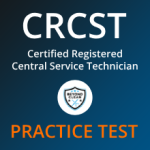Finding a job as a sterile processing technician requires a blend of knowledge, personality, and perseverance, especially if you want to get one of the best-paying jobs in the industry.
Sterile processing techs work behind the scenes to clean and sterile medical equipment between patients, providing a safe and sterile environment for everyone involved.
The job requires, at minimum, the equivalent of a high school degree or a diploma, but you’ll get more education on the job.
Here’s how to make the most of your job search to become a sterile processing technician.
Tip #1: Get the Necessary Education and Certification
Most job descriptions will list the minimum education and desired education levels.
Specialized courses in sterile processing and infection control are highly recommended.
There are two ways to approach this.
First, you can get a job right out of high school in the field.
It will likely be an apprentice or assistant sterile processing position with lower pay, but you’ll get the hands-on experience you need to take your skills to the next level.
Second, you can opt to take a certification course or attend a community college or technical school to get a degree in sterile processing, there are also online programs available.
In some cases, the courses will include taking a sterilization certificate.
The most common certificates recommended or required are the CBSPD (Certification Board for Sterile Processing and Distribution) or the CRCST (Certified Registered Central Service Technician).
These certificates require a passing grade but also a certain number of hands-on experience hours.
Tip #2: Build Experience Through Internships or Entry-Level Roles
No matter which path you take to get healthcare experience, you’ll make great contacts along the way and get great experience in the field of sterile processing.
Look for job listings that are internships, externships, apprenticeships, or part-time to make room for education if that’s your chosen route.
While you’re in that work experience, find supervisors who will offer references or career feedback.
Tip #3: Leverage Job Search Platforms and Networking
Don’t wait until you have a certification to maximize the potential of networking in the field.
Use LinkedIn to find resources for learning, like how to nail a job interview or how to answer tough interview questions.
Connect with people in the field, even those in positions that supervise sterile processing employees, and interact with them through posts and messaging.
Join organizations like the Healthcare Sterile Processing Association to get valuable resources like news updates, job listings, and how-to videos.
Tip #4: Create a Professional Resume and Cover Letter
Find successful people in the field and review their resumes.
Craft yours to mimic the skills that you have, showcasing your experience in any science, math, chemistry, or technology.
Include your certification, any internships, and relevant work experience in your resume, and then punctuate that experience in your cover letter.
Share your passion for sterile processing and how your skills align with the employer’s needs.
Be specific about your accomplishments, such as improving the sterilization process or contributing to patient safety.
Tip #5: Prepare for Interviews and Practice Common Questions
Some say that sterile processing is a great job for introverts since a lot of time is spent in solitude working on focused tasks.
However, you have to land the job through the interview process, which is where your personality and passion can shine.
At the same time, be prepared to answer questions about your technical knowledge, such as the sterilization cycle, instrument identification, or infection control protocols.
Employers may also ask situational questions to gauge how you handle stressful situations or unexpected challenges in a fast-paced environment.
I always find it best to have a friend or family member do mock interviews with you, preparing tough questions so you can better handle the real-life interview.
Also, familiarize yourself with the organization, showing interest in their specific sterilization practices and how you can contribute to their team.
Tip #6: Explore Opportunities in Various Healthcare Settings
Sterile processing technicians are needed in a wide range of healthcare settings, not just hospitals.
That can even include veterinary officers and dental facilities.
Working or interning in different settings exposes you to various types of equipment, procedures, and team dynamics.
For example, a smaller outpatient clinic may require you to multitask, while a large hospital might allow you to specialize in certain sterilization techniques.
Being open to different environments can increase your job prospects.
Also, many sterile processing technicians want traveling jobs, which pay more.
The more experience you have, the better chance you have of getting those highly desired positions.
Tip #7: Explore Additional Certifications
The healthcare industry is constantly evolving, with new technologies and techniques being introduced regularly.
To stay competitive, sterile processing technicians should continue learning by taking advanced courses or attending workshops.
Certification is generally required to be renewed every five years, but there are additional levels you can take an exam for, like endoscopy or management.
Many healthcare organizations offer continuing education opportunities to keep employees up-to-date on the latest sterilization methods and compliance regulations.
Tip #8 Don’t Forget to Interview the Employer
An interview for a sterile processing job isn’t a one-way street.
You’ll see in many social forums that the biggest complaints sterile processing techs have included “toxic” work environments or micromanagers.
Ask questions like:
- “What is the management style in the sterile processing department?”
- “How are mistakes and feedback handled?”
- “What is the conflict resolution policy?”
- “How much overtime is expected?”
- “During busy periods, how is workload spread among colleagues, even during staffing challenges?”
As with any job, colleagues and managers will be just as important as your skills and job enjoyment.
Frequently Asked Questions
Where do sterile processing techs make the most money?
Sterile processing technicians fall under the Bureau of Labor Statistics (BLS) job title as Medical Equipment Preparers.
As of May 2023, the highest-paying states were California, the District of Columbia, Alaska, New Jersey, and Delaware.
Keep in mind that California, D.C., and Alaska are also the states listed in the Top 10 Highest Cost of Living, so the pay rate might appear high but still not be the best value compared to the cost of living index.
All the Top 10 highest-paying cities for sterile processing techs are in California.
Regions that pay the highest outside of major metropolitan areas include some California regions, but you can also look to northwestern Colorado and western Washington state.
How stressful is it to be a sterile processing technician?
Being a sterile processing technician can be quite stressful due to the high level of responsibility and attention to detail required.
The importance of sterilizing and managing medical instruments used in surgery and other critical procedures is tied to patient safety.
Any mistake could lead to infections or patient complications.
The fast-paced nature of the healthcare environment adds pressure, as technicians often work under strict deadlines.
The stress levels will increase when working in high-volume hospitals or clinics.
Check out some of the r/sterileprocessing feedback on Reddit to get real-life examples of stressful situations and how to handle them.
What states require sterile processing certification?
All states that require certification for sterile processing technicians are east of the Mississippi River.
Those states are Connecticut, New Jersey, New York, Pennsylvania, and Tennessee.
Minnesota, Florida, and Massachusetts have legislation pending as of late 2024.
However, don’t let the lack of state requirements be misleading.
Hospitals and healthcare facilities can require certification as part of their job duties, including a passing grade within the first year of employment.
This page is also available in Spanish.










